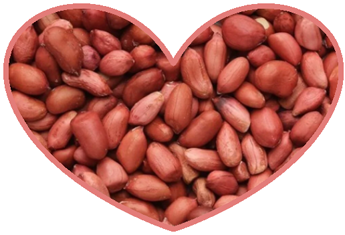Why Eating Peanuts Daily is Good for Heart and Overall Health
Peanuts, though commonly thought of as nuts, are actually legumes obtained from small dicotyledonous plants. However, they provide similar nutritional benefits as popular tree nuts like almonds, pecans, and walnuts.

Why Peanuts Are Called "Poor Man’s Almonds"
Peanuts are grown abundantly in tropical and subtropical regions, even in drought-prone areas. They are short-term crops, easy to cultivate, inexpensive, and available year-round. Because of their affordability and superior nutrient profile, peanuts are often called “poor man’s almonds.”
Nutritional Value of Peanuts
Peanuts are nutrient-dense foods rich in:
Plant-based protein (25–30 grams of protein per 100 grams)
Unsaturated fatty acids
Monounsaturated fats like oleic acid
Vitamins and minerals
Phenolic antioxidants (Resveratrol)
These bioactive compounds make peanuts powerful allies for heart health, weight management, and overall wellness.
Resveratrol in Peanuts: A Powerful Antioxidant
Peanuts are also a natural source of resveratrol, a polyphenol compound also found in grapes, red wine, and berries. Resveratrol is known for its:
Antioxidant effects (protects cells from damage)
Anti-inflammatory benefits
Heart and brain support
Anti-aging properties
Peanuts and Heart Health
Clinical studies suggest that peanut consumption helps lower the risk of coronary heart disease. In 2003, the FDA concluded that consuming 43 grams (1.5 oz) of peanuts daily as part of a low-fat diet “may reduce the risk of heart disease.”
Peanuts are proven to:
Lower LDL cholesterol (“bad” cholesterol)
Increase HDL cholesterol (“good” cholesterol)
Reduce blood pressure and improve the body’s response to stress
Additionally, peanuts support reverse cholesterol transport, a process in which HDL cholesterol removes fatty deposits from clogged arteries—protecting against heart disease.
Longevity Benefits of Peanuts
A long-term Harvard study published in the New England Journal of Medicine revealed that daily peanut eaters were:
20% less likely to die from cancer, heart disease, or respiratory disease
More likely to maintain healthy weight over time
This shows that a simple habit—eating a handful of peanuts a day—may help extend lifespan.
Peanuts and Weight Management
Although peanuts are high in fat, the majority are healthy unsaturated fats. Combined with their protein and fiber content, peanuts help control hunger, delay digestion, and promote satiety. Research shows that frequent peanut eaters are less likely to gain weight compared to non-eaters.
Ways to Add Peanuts to Your Diet
Incorporating peanuts into daily meals is easy:
Enjoy gently roasted peanuts as a snack
Spread peanut butter on whole-grain toast instead of butter or cream cheese
Sprinkle chopped peanuts on cereal or yogurt
Toss peanuts into a fresh salad or stir-fry
Top fruit or crackers with peanut butter
In Summary
Regular consumption of peanuts supports heart health, longevity, weight control, and provides a powerhouse of nutrients and antioxidants. Adding a handful of peanuts daily is a simple, affordable step toward better health. Medical Disclaimer.
Read further on:
≺≺ Why should I combine Avocados and Tomatoes?
≺≺ Cholesterol: What Does Diet Have to Do with It?
≺≺ Which food is most associated with helping people live longer?
≺≺ Is Plant-Based Protein the Key to a Longer, Stronger Life?
≺≺ How important is fiber in the diet?
≺≺ What Is the Ketogenic Diet? Is the Keto Diet Right for Everyone?
≺≺ What cardiovascular benefits do berries provide?
≺≺ What is the Okinawan diet? What is the secret behind Okinawan long life-expectancy?
≺≺ Ultra-Processed Foods: What They Are, Why They’re Harmful, and How to Cut Back.
≺≺ What grains have the lowest glycemic index?
≺≺ How Important Is Protein for Your Health?
≺≺ is your kid getting too much protein?
≺≺ What foods and vitamins are good for your skin?
≺≺ EWG's- The Clean Fifteen: Fruits and Vegetables with the Lowest Pesticide Levels.
≺≺ What eating strategies work best for losing weight long term?
≺≺ How Do Sugary Meals and Beverages Harm Dental Health?
≺≺ Why Vitamin B12 Is Important for Your Health?
≺≺ What foods should people with high blood pressure avoid?
≺≺ What food is most effective for moderating blood sugar?
≺≺ What are antioxidants? How antioxidants in the fruits and vegetables help in preventing cancers and diseases?
≺≺ How can I reduce the risk of cancer-causing chemicals when cooking or grilling meat?
≺≺ What happens to my blood vessels when I gain weight?
≻≻-Back to Home page.
Further reading (External Links opens in new window):
≺≺- The New England Journal of Medicine - Association of Nut Consumption with Total and Cause-Specific Mortality.
≺≺- Harvard Health Publishing - Eating peanuts may extend your life.